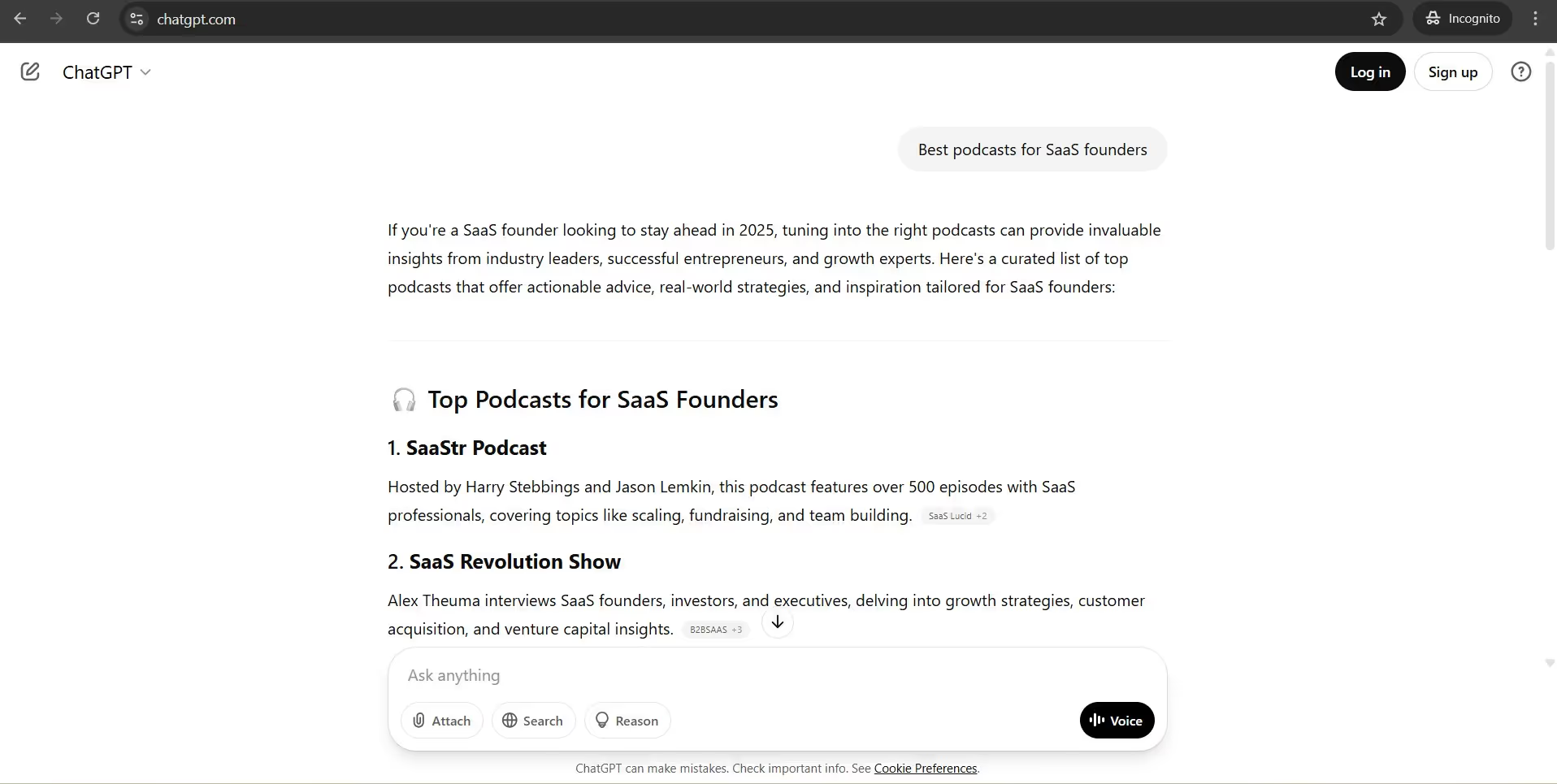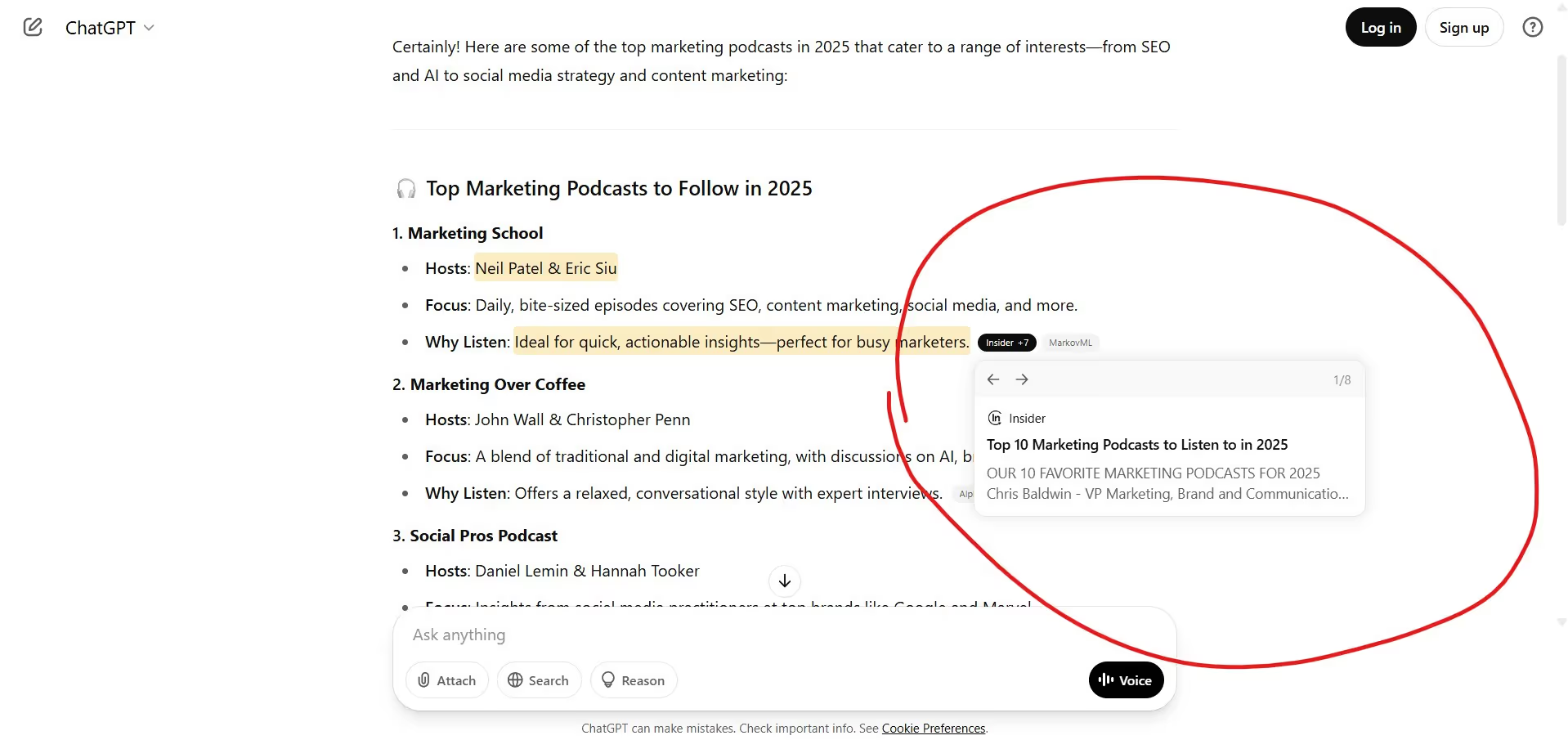🪄 AI Summary
As of February 2025, ChatGPT ranks as the 8th most visited website globally according to Semrush data.
Brad Lightcap, Chief Operating Officer at OpenAI, shared that ChatGPT currently has 400 million weekly users and is aiming to reach 1 billion users by the end of 2025.
Welcome to the world of AI Search Optimization (AISO)! A new approach to content strategy where your goal isn't just to rank on Google, but to become the answer AI gives. With AI tools like ChatGPT becoming a major part of how people search, learn, and discover content, making AISO (AI Search Optimization) should be the top priority for all marketers!
As more people turn to AI tools like ChatGPT for personalized recommendations, one question matters more than ever for podcasters: “How do I make ChatGPT recommend my podcast?”
In this blog, you'll learn exactly how to optimize your podcast so ChatGPT can find, understand, and recommend it to users based on context, intent, and authority.
Let’s dig deep into the strategies:
Strategy 1: Show Up for Simple Podcast Searches
These are high-intent prompts users type directly into ChatGPT, like:
- “Best podcasts for SaaS founders”
- “Top AI marketing podcasts”
- “Podcasts like My First Million but for B2B”

How to Execute
- Run Sample Queries in ChatGPT
- Try:
- “Best podcasts for [your niche]”
- “Top podcasts about [your topic] for [your audience]
- “Best podcasts for [your niche]”
- Try:
- Record which podcasts are recommended and which sites ChatGPT cites.

- Target Trusted Sources
- Identify blogs, newsletters, or media sites that are referenced in ChatGPT’s answers.
- Pitch your podcast for features, guest appearances, or listicle inclusions (e.g., “10 AI Podcasts to Follow in 2025”).
- Identify blogs, newsletters, or media sites that are referenced in ChatGPT’s answers.
- Create a Discoverable Podcast Page
- Use a dedicated URL like /top-episodes, /about-the-podcast, or /podcast-recommendations: This gives clear, focused signals to search engines and AI models about what each page is about. This helps them better understand and categorize your content, making it more likely to appear in relevant searches. Clean, descriptive URLs also improve user experience and increase the chances of being featured in AI-driven answers or recommendations.
- Include:
- Clear summaries
- Who the podcast is for
- Top recommended episodes
- Topics covered
- Clear summaries
- Add structured data (schema) for podcasts, FAQs, and reviews: Adding structured data (schema) means adding special code to a website that helps search engines like Google understand the content better. For podcasts, it shows episode details; for FAQs, it highlights questions and answers; and for reviews, it displays star ratings. This is important for AISO because it improves how the site appears in search results, making content more visible and engaging. Better visibility can lead to more traffic, better user trust, and higher rankings.
- Use a dedicated URL like /top-episodes, /about-the-podcast, or /podcast-recommendations: This gives clear, focused signals to search engines and AI models about what each page is about. This helps them better understand and categorize your content, making it more likely to appear in relevant searches. Clean, descriptive URLs also improve user experience and increase the chances of being featured in AI-driven answers or recommendations.
Bonus: Include phrases like “best podcast for [audience]” and “top episodes for [use case]” in headers and metadata because AI models love context. This helps AI understand what a page is about and who it's for. When you include phrases like “best podcast for [audience]” or “top episodes for [use case],” you're giving clear, relevant clues about the content. This helps AI match your page with what people are searching for, improving your chances of showing up in search results and being recommended. Context makes content more discoverable and useful.
Strategy 2: Show Up for Contextual Queries
Users don’t just ask “best podcast for marketing.” They say things like:
“I’m a solopreneur in Europe launching an AI tool. What are some good podcasts on growth and branding?”
ChatGPT personalizes its responses. If your podcast isn’t framed for those use cases, you’ll be skipped.
How to Execute
- Understand the Contexts You Serve
- Identify:
- Your ideal listeners (role, industry, company size)
- Topics most relevant to their challenges
- Common tools or trends they follow
- Your ideal listeners (role, industry, company size)
- Identify:
- Update Your Podcast Page to Reflect Context
- Add content like:
- “This podcast is for X type of person”
- “Our listeners include [industries, roles, stages]”
- “Covers tools like Zapier, Notion, HubSpot”
- “This podcast is for X type of person”
- Add content like:

- Tag Episodes with Contextual Metadata
- In your show notes, write:
- “Perfect for marketing teams at early-stage startups”
- “A must-listen if you’re using Webflow or Airtable”
- “Perfect for marketing teams at early-stage startups”
- This helps ChatGPT connect your episodes to specific queries.
- In your show notes, write:
Strategy 3: Monitor and Correct AI Misunderstandings
ChatGPT isn’t always accurate and if it misunderstands your podcast or skips it due to lack of data, your visibility suffers.
How to Execute
- Ask ChatGPT Directly
- “What is [Your Podcast] about?”
- “Is [Your Podcast] good for [niche/topic]?”
- “What is [Your Podcast] about?”
- Look for Omissions or Inaccuracies
- Is your show missing entirely?
- Is it described incorrectly?
- Is your show missing entirely?
- Publish Corrective Content
- Blog post: “What Our Podcast Covers (And Who It’s For)”
- Comparison post: “Why [Your Podcast] Is Different from [Popular Podcast in Your Niche]”
- FAQ section:
- “Is [Podcast] beginner-friendly?”
- “Who hosts the show?”
- “Best episodes for X?”
- “Is [Podcast] beginner-friendly?”
- Blog post: “What Our Podcast Covers (And Who It’s For)”

- Repeat Key Facts Across Your Site
- Reinforcement helps AI “learn” your podcast’s relevance.
- Use declarative headings like:
- “Why We Created [Podcast Name]”
- “Best Episodes for SaaS Marketers”
- “Why We Created [Podcast Name]”
- Reinforcement helps AI “learn” your podcast’s relevance.
Quick Checklist to Make ChatGPT Recommend Your Podcast
- Create a structured podcast page with context and episode highlights
- Add schema markup and keywords used in AI prompts
- Get cited by trusted AI-visible sources (guest features, press, newsletters)
- Include transcripts of all episodes for crawlability
- Write blog content that reinforces your podcast’s niche and audience
- Monitor what ChatGPT says about you and fix inaccuracies fast
Basically just ensure your content is structured, contextual, and easily understood by AI models helping it stand out in this new era of AI-driven discovery.
ChatGPT and other AI tools aren’t magical; they synthesize what’s already online. If your podcast isn’t clearly described, cited, and structured, it won’t get recommended.
Start today. Make your podcast discoverable, contextual, and credible in the eyes of AI.
Author:
Arpita Lenka
Helping you create more content with less effort.

